What exactly is the age of consent in Nigeria? [Explainer]
)
As of today, if you type ‘age of consent Nigeria’ on your Google search bar, the most authoritative thing you will get is from a website - ageofconsent.net - which wrongly pegs the Nigerian age of consent at 11, when it is 18.
Conversations around rape, pedophilia, child marriage, and sexual harassment have intensified in the court of public opinion and have taken center stage on Twitter, the quintessential vehicle for activism and contemporary conversations in the 21st century. Thus, the Nigerian age of consent has been subject to intense questions at such trying times.
What is the age of consent in Nigeria?
The real age of consent in Nigeria is 18. Section 31 (3) (a) of the Child's Rights Act 2003 states that, “Where a person is charged with an offence (of unlawful sexual relations with a child) under this section (31 of the same act), it is immaterial that the offender believed the person to be of or above the age of eighteen years.”
While the Law didn’t expressly provide that the age of consent in Nigeria is 18, the gamut and purport of section 31 of the Child's Rights Act implies that "the age of eighteen years" is a benchmark that could determine the difference between an adult and a child.
Thus, if "the age of eighteen years" is mentioned, the age of 18 is a determinant of whether anyone can or cannot give their consent to have sex. Some might argue on the premise of the Law, over the lack of clear statement, but the same Child's Rights Act provides that the minimum age for marriage to be 18.
The Mischief Rule of the canons of legal interpretation looks at the mischief a provision of Law seeks to rectify. By that Mischief Rule, if the Law is unconcerned with an offender’s lack of knowledge of a victim when he has carnal knowledge of her and seeks to punish that mischief (offence) regardless, and makes the age from which a person’s perception to be wrong as 18, then the age of consent is 18.
Also noteworthy is that the constitution is also silent on the minimum age of consent in Nigeria.
Why do Nigerians think the age of consent is 11?
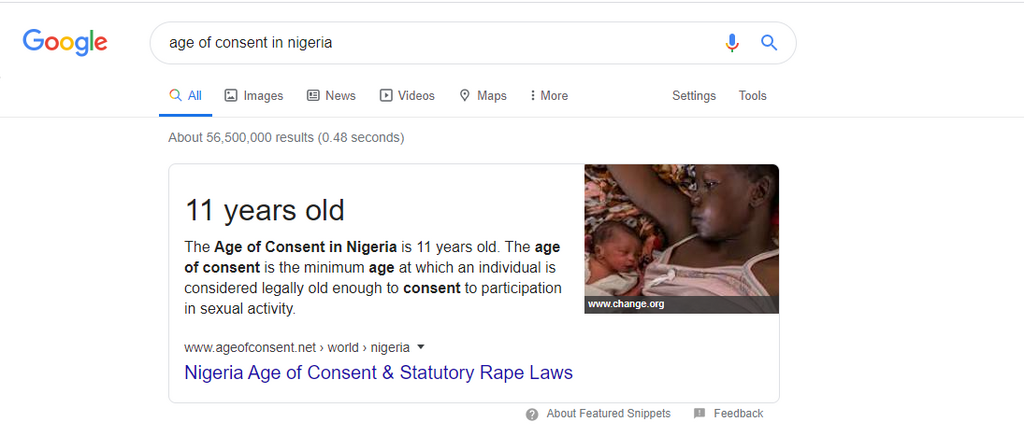
Asides the problem of international misinformation championed by the infamous website, ageofconsent.net, the reasons are a threefold;
- The sexual offences bill.
- The uncertain minimum age of marriage in Nigeria.
- The problem of state Laws across Nigeria.
The unpopular Sexual Offences Bill issue
Following the very high-profile controversies of Senator Sani Ahmed Yerima who married a 13-year-old girl in 2013, second quarter 2015 birthed the Sexual Offences Bill. It was one of 46 laws hurriedly passed by the penultimate National Assembly. It stipulates life imprisonment as punishment for any individual convicted of having sexual intercourse with a minor.
But as the Law was passed, probably due to misinformation, Nigerians thought the National Assembly had reduced the age of consent from 18 to 11. Thus, Premium Times decided to do a “fact check” on the matter.
In the report, Premium Times documented criticisms from eminent Nigerians like Professor Wole Soyinka and Senior Advocate of Nigeria, Chief Femi Falana (SAN) who reportedly described the bill as “obnoxious."
Falana reportedly said, “It was that Committee (Committee on Judiciary and Legal Matters) that illegally removed the age of 18 years and replaced it with 11 years.”
Whereas in truth, Section 7 of the Sexual Offences Bill prohibits sexual intercourse with anyone between the ages of 0 to 18. It punishes offenders with life imprisonment upon conviction. That Section 7 states that;
- A person who commits an act which causes penetration with a child is guilty of an offence called defilement.
- A person who commits an offence of defilement with a child aged eleven years or less shall upon conviction be sentenced to imprisonment for life.
- A person who commits an offence of defilement with a child between the age of twelve and fifteen years is liable upon conviction to imprisonment for life.
- A person who commits an offence of defilement with a child between the age of sixteen and eighteen years is liable upon conviction to imprisonment for life.
What birthed this misinformation that '11' is the age of consent in Nigeria?
The problem stems from people who only read the provision of Section 7 (2) above which states that, “A person who commits an offence of defilement with a child aged eleven years or less shall upon conviction be sentenced to imprisonment for life.”
They interpreted the benchmark for age of consent to be 11 without reading the provisions of sub-sections (3) and (4) of that Section 7.
The provisions of Section 7 (3) and (4) further prohibits sexual intercourse with children between the ages of twelve and fifteen years and sixteen and eighteen years respectively, and equally punishes those cases with life imprisonment. The criticism of the bill was popular, so it probably became a standard across international media and the object of misinformation.
The problem is also partly the draftsman's fault. He could have simply punished all sexual acts with any child under the age of 18 with life imprisonment. The breakdown of Section 7 into different ages of the Sexual Offences Bill complicated matters.
If Section 7 of the Sexual Offences Bill had simply stated that, “Anyone who is found guilty of having sexual intercourse with a child under the age of 18 will be sentenced to imprisonment for life," we might not have had this problem. Such unnecessary dichotomies (as in the aforementioned Section 7) should not be a characteristic of the legal draftsman.
The ambiguous minimum age for marriage
The Matrimonial Causes Act is silent on the minimum age for marriage in Nigeria. Section 3 (1) (e) of the same Act, which covers reasons why a marriage could be void only mentions a ‘marriageable age’ without specifying what that marriageable age means. However, Section 18 (1) of Marriage Act specifies the minimum age for marriage when consent is required to be 21.
Of all the Laws, the Child's Rights Act was the most explicit, stipulating the minimum age for marriage to be 18. However, that has only been adopted by 24 Nigerian States.
Section 18 of the Child's’ Rights Act 2003 states that, “No person under the age of 18 years is capable of contracting a valid marriage, and accordingly a marriage so contracted is null and void and of no effect whatsoever.”
The problem of State Laws in Nigeria
In Nigeria, State Houses of Assembly can make Laws to operate in the state they serve. By Law in some Nigerian states, children as young as 12 could still legally get married. With the Child's Rights Act only being adopted by 24 states, 12-year-old girls can still get married in some Nigerian states.
However, where there is a clash between the provisions of State Laws and the provisions of an Act of the Federal Republic of Nigeria - passed by the National Assembly, the provisions of an Act of the National Assembly shall prevail.
Where there is a Lacunae ( no provision) on an issue by an Act of the Federal Republic of Nigeria, while a State Law has a provision on the same issue, the provision of that State Law shall be effective when the matter is required for prosecution within the walls of that state.
While pedophilia is an infamous practice across Nigeria, child marriage is more common in the North and seemingly backed up by religious claims of Islam. It is claimed that Prophet Muhammed married a 9-year-old girl. In the recent #ArewaMeToo, quite a few of those cases happened when the victim was under the age of 18 – one of the victims was 13 when she was a victim.
That said, practitioners of Islam have argued that the marriage of Prophet Muhammed to said Aisha, whose age has been repeatedly reported as nine, is a misinformation. They argue that in the days of Prophet Muhammed, girls mature faster than they do now. Some clerics have also argued that Aisha was 19 and not nine when she married Prophet Muhammed.
Some Nigerian Islamic clerics have since warned about conflating Islamic theories on marriage with primitive, yet acceptable cultural practices of child marriage in the Northern parts of Nigeria. They argue that the popularity of Child marriage in the North is not necessarily backed by Islamic or Sharia Law, but instead an incidence of primitive cultural practices in the North.
Their point is premised on how Muslims criticized Senator Sani Ahmed Yerima after he took a 13-year-old bride. These practitioners of Islam also point out that if anyone will marry any woman in Islam, the woman must verify that she;
- Consents to the marriage by herself - not by her parents.
- Is physically, mentally, psychologically and physiologically ready to get married.
The practitioners of Islam have a point, but it's a hard sell. If a 13-year-old girl has been conditioned to see early marriage and conception as a cultural source of pride, she will likely agree to early marriage.
![Vice President Yemi Osinbajo attends the burial of former President of Kenya, Arap Moi. [Twitter/@ProfOsinbajo]](https://image.api.sportal365.com/process/smp-images-production/pulse.ng/16082024/32f27754-6654-4018-9979-eee21c3c7693)
Nonetheless, Vice President Yemi Osinbajo has also noted that, “There is a positive correlation between child marriage, poverty and Illiteracy. The states with the lowest level of illiteracy have the highest rate of child brides.”
Thus, with the unpopular accepted religious and cultural standards across certain parts of Nigeria, some state Laws might be at loggerheads with provisions of a Law like the Child's Rights Act on age of consent in Nigeria.
They could state or imply the age of consent to be 11, 12, 14, 13 or 15. These provisions could also charge the batteries of misinformation and fuel people on a charade of futile intellectualism.
Actions by Citizen Gavel

Citizen Gavel is a not-for-profit organization that uses its nationwide network of Lawyers to help Citizens out of Legal fixes with no upfront payments. Theirs is a young but large network of Lawyers willing to work pro bono. The organization was active during the #EndSARS campaign and worked alongside Segun Awosusi also known as Segalink and rap legend, Ruggedman.
While a petition was circling the internet to change the age of consent in Nigeria, Pulse stumbled upon a Tweet dated February 8, 2019, by the non-profit legal organization, Citizen Gavel’s Twitter account. It sent a tweet to Google’s Twitter account, @Google to take down the misinformation that the Nigerian age of consent is the lowest in the world – pegged at 11.
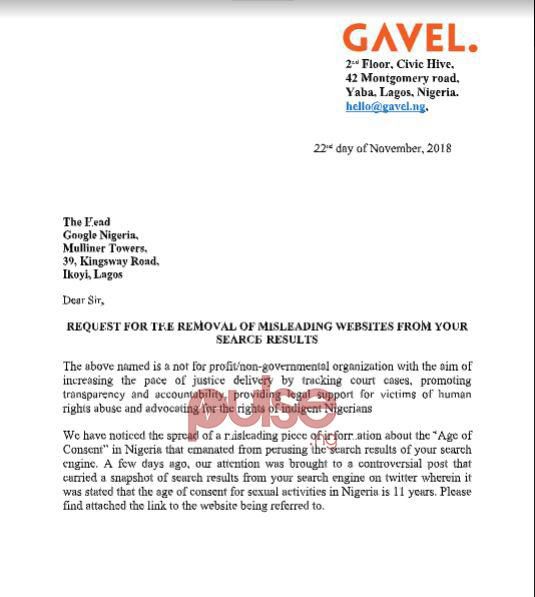
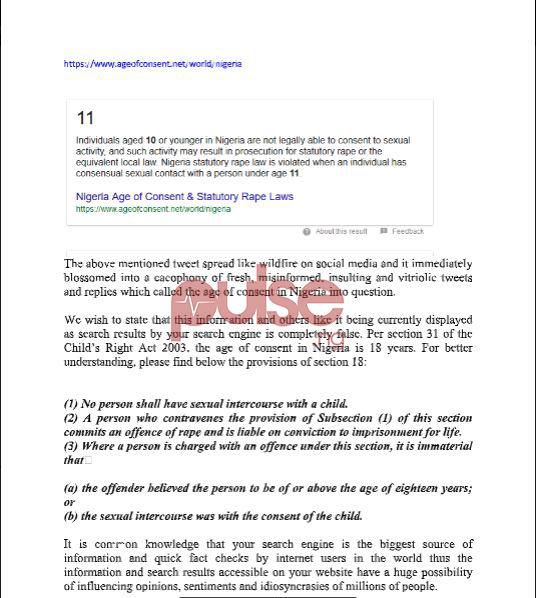
Speaking to Lead Counsel at Citizen Gavel, Oluwafemi Ajibade, he tells Pulse that, “On the 22nd day of November, 2018, we wrote a letter to the Nigerian branch of Google. The letter was predicated on the spread of a false information about the age of consent in Nigeria.
“The information making the rounds on the Nigerian social atmosphere at the time was that the age of consent is 11 years old. The gravity of the situation online was exacerbated by Google search results spewing out data confirming the erroneous information.
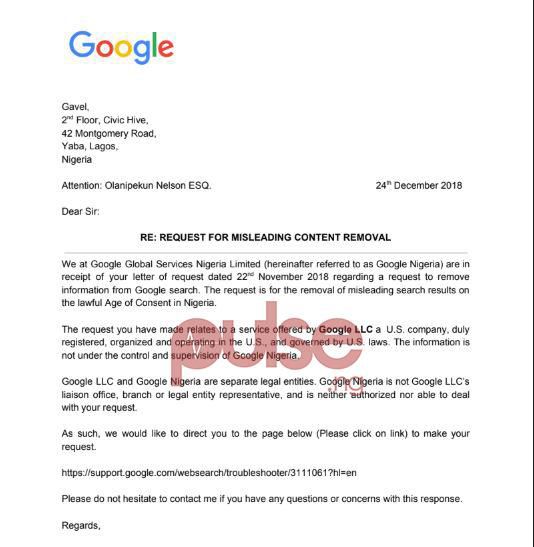

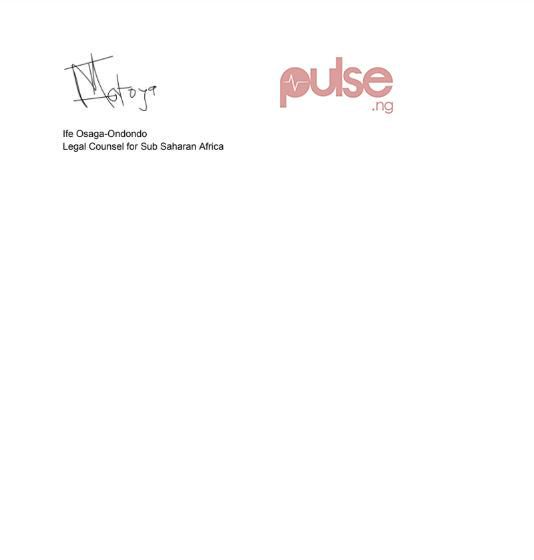
“Google replied to our letter a month later. We followed the instruction stated in the reply but we have not gotten any feedback till date.
“We are not relenting our efforts to change this grossly misleading view as we have taken it upon ourselves to respond to every situation wherein the false information is being or likely to be spread and promptly correcting same.”
Despite these issues, Ajibade tells Pulse that Citizen Gavel still plans to message Google as long as the misinformation persists and continues to cause a problem on Twitter Nigeria.
As at the morning of March 12, 2020, a simple search of 'age of consent Nigeria' will still bring you the false information from ageofconsent.net that the Nigerian age of consent is 11.

![Aisha blows hot on Security forces; Y7ou won't believe what she said [VIDEO]](https://image.api.sportal365.com/process/smp-images-production/pulse.ng/17082024/1f976edf-1ee2-4644-8ba1-7b52359e1a8f?operations=autocrop(640:427))
)
)
)
![Lagos state Governor, Babajide Sanwo-Olu visited the Infectious Disease Hospital in Yaba where the Coronavirus index patient is being managed. [Twitter/@jidesanwoolu]](https://image.api.sportal365.com/process/smp-images-production/pulse.ng/16082024/377b73a6-190e-4c77-b687-ca4cb1ee7489?operations=autocrop(236:157))
)
)
)
)
)
)
)
)
)
)